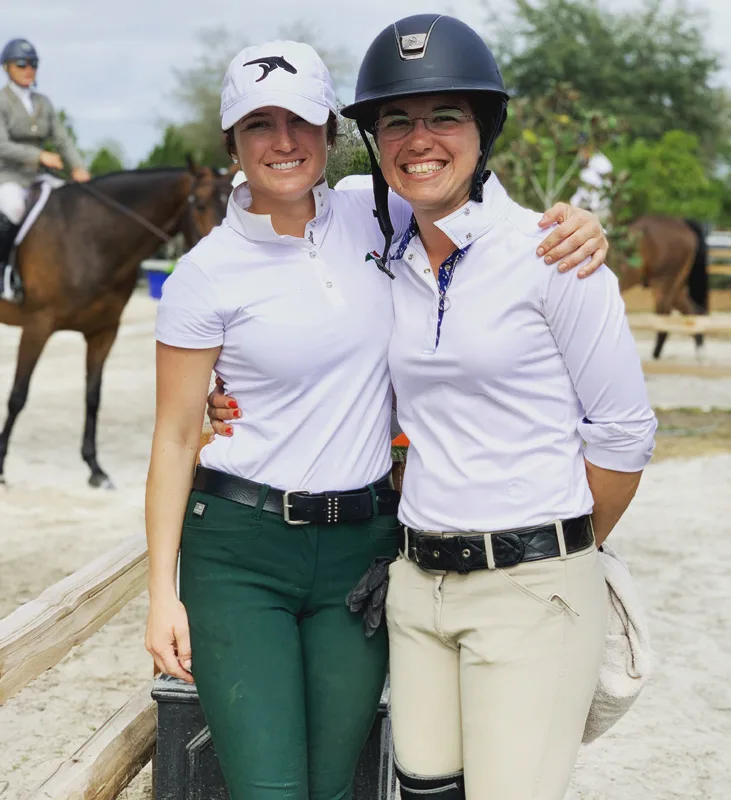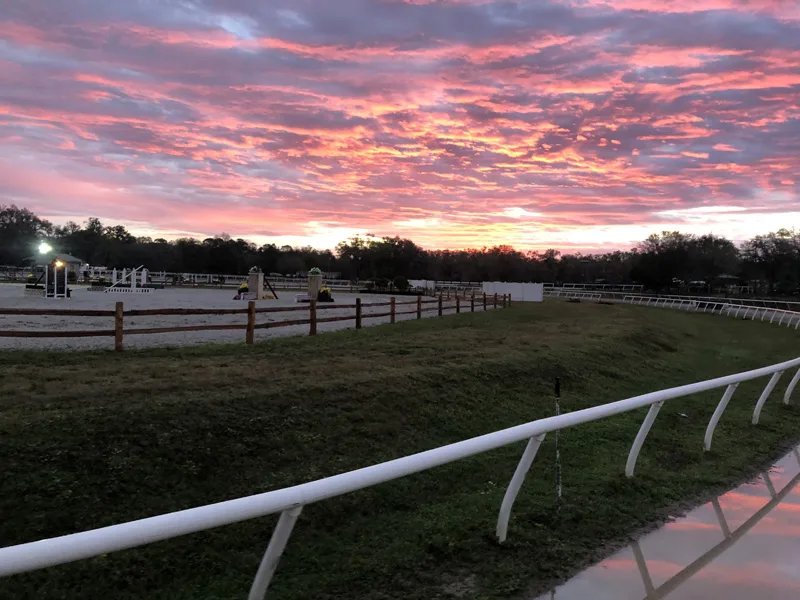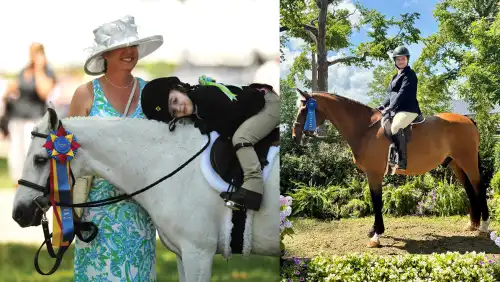By Week 6 of HITS Ocala (Florida), I had given up on the self-care I preached to you in my last blog. To be honest, I’m surprised and excited I made it that long. It’s hard to care for yourself during a demanding 10-week circuit.
My weekly schedule looks like this: Tuesday is warm-up day, Wednesday and Thursday any horses my boss Amanda Steege is showing in the professional divisions go, and Friday, Saturday and Sunday are reserved for the amateur clients. Sometimes Amanda will show a couple in the hunter derby on Saturdays, but it varies week to week. I’m up before 5 a.m. on most days, and our days are fairly long, often ending around 6 or 7 p.m. It’s constant movement and requires adjusting the schedule all day—some rings go slower, some rings go faster, some rings have 20 adds that rack up another two hours of a division, and some rings get held up while the last rider is finishing in another ring.
I ride a lot every day and spend time coordinating with the in-gates and organizing so we can finish all the other tasks that need to be completed at the barn. We have 17 horses, all of which have their own schedules. Don’t get me wrong, the work is all worth it! We win a lot of the classes, and our horses claim a lot of tricolors. There are plenty of smiles to go around.

Amateur-owners Lisa Arena-Davis (left) and Jacqueline Maggiore had great success this season. Photos Courtesy Of Nicole Mandraccia
But by the time I’m finished, the last thing I’m thinking about is stretching. I was foam rolling at the end of every day before I showered and got into bed, but by Week 6, sleep became too essential and took precedence over everything. I got lazy. I kept reminding myself at the beginning of every day that I needed to do it, but I totally lost all focus by the end of the day. (Side note: I will have you know that I did stick to my one-Coke-a-day and absolutely no Diet Coke!)
In previous years, at some point during the circuit, my knee usually begins to bother me. On Tuesday of Week 9, I went to get out of my car, and I heard a loud pop. I felt immediate pain in my right knee, and I could feel it swelling the more I walked around. This has happened to me before; it’s soft tissue damage. I tried to ignore it, thinking it would get better the more I moved. Not so much.
As much as it killed me to admit, I had to tell Amanda I couldn’t jump in a ticketed warm-up because the pain was so terrible. I couldn’t even finish my ride list. By the next day, I needed to go to the doctor. By the third day, I couldn’t even stand on it.
The doctor recommended I rest for several days until I could be evaluated by an orthopedist and an MRI. I attempted to work on Saturday, which is usually our busiest day, because I felt bad about abandoning my team. The barn was definitely going to need my help to finish the last week of circuit. I made it an hour and had to leave. Anyone who knows me knows this never happens. I usually fight through the pain and keep going.
ADVERTISEMENT
It turns out that due to the coronavirus pandemic, the circuit ended a week early. It gave me some time to rest and try to get better so I could return to work. I iced and elevated my knee as much as possible. It killed me to not be working, and I panicked for a solid week (like every hour of every day) about not making money. Those of us in the horse world know what happens when you are injured: You are in some serious trouble—physically, financially and mentally.
But as the weeks wore on, and the quarantine measures became stronger, I realized there were a lot of Americans in my workless situation. Many of my friends who live in New Jersey, New York, Pennsylvania, Massachusetts and Connecticut who own boarding and training facilities have closed down their lesson programs and aren’t making income either. A few are not riding because they are scared of getting hurt and inundating hospitals with emergencies that the hospitals can’t handle right now. They are exercising the horses with turnout, longeing and hot walkers or treadmills. They are doing the best they can for their animals, but, truth be told, they are not happy about having to close their barns. They understand it’s the only way to stop the spread of this virus, and they reluctantly did it. What they lose in money, they gain by keeping their employees, families and children safe. They may have elderly parents or an immuno-compromised child at home. They are being cautious because this virus is destroying lives.
Some of my other friends remain unaffected. They live in states where quarantine measures do not exist right now. They may not be able to horse show due to U.S. Equestrian Federation recommendations, but their business still goes on as usual. It is possible that they also have extra time because they are not packing up to go to horse shows.
If I could actually work right now, I would be using this extra time to my advantage. I’m the queen of finding projects on a farm. When I worked for the Faircloughs, weekends were reserved for two things: horse shows or projects. That blanket room organization you’ve been dreading? The feed room that’s gotten out of control? Those tack trunks you haven’t organized? The copious amounts of tack you haven’t conditioned all winter? The extra bin (or bins) with items you no longer use that could be donated? Grab one of your employees and hop to it! If you don’t have someone to help, turn on your favorite pump-up music and get the job done. There’s no one to interrupt you!
You can also use this time to strengthen your social media presence, put together lesson packages that your lesson kids and parents can prepay for, work on your young green horse’s ground manners, and organize your taxes for your business and yourself. Ride if you feel it’s safe and work on flatwork and small jumping exercises, or watch informative riding videos. Find a podcast to listen to while you muck stalls. Do yoga at home with videos from YouTube or Instagram. Groom as many horses as you can each day. Watch how nicely their coats fill in and shine by the end of this quarantine! Pull manes, clip, start a garden. The possibilities are endless!
If you have projects that need to be done around the farm, consider hiring one of the local horse show guys to help you out. Do your paddocks need to be picked out and chain-raked? Do farm buildings or your fence lines need a fresh paint job? Do you want to build some new jumps? Does your ring need to be fixed? Most of the crew, drag or in-gate guys are temporarily out of work, and I’m sure a couple of them would jump at the chance to earn some extra money if you have it to spend. My boyfriend Lee has several local jobs lined up for him in Aiken, South Carolina, and it’s helping him muddle through this difficult financial time.
I also completely understand the frustration of those who are trying to figure out how they’re going to feed their lesson horses without income. My heart goes out to them. I’m also not making any money during this time because I can’t work or ride. I’m away from my horses, which is making me question my sanity at times. Riding is my stress relief, and without it, I become exceptionally anxious. I, too, cannot pay my bills. This is a stressful time for us all. We’re all in this together, not only in the horse world, but also nationally and globally.
ADVERTISEMENT
But the way I see my personal coronavirus quarantine is: I can use the extra time to my advantage to grow and develop better habits and positively influence my life, or I can waste the time, be bitter and gain nothing from it. What is the good in approaching this situation with a negative attitude?
I could use this downtime to watch funny videos on YouTube, surf social media or binge-watch Netflix. OR I could be methodical and help myself grow and heal. The first one sounds tempting and would definitely pass the time, but what am I gaining from that exactly? Entertainment? How does that help me become a better, stronger person? How does that help me get back to work? It doesn’t.
I’ve made myself a daily schedule so I feel a sense of accomplishment in completing tasks, just as I would normally do by crossing things off the barn whiteboard. I’ve altered my morning routine, which includes stretching, reading, journaling, heat and ice therapy on my knee (just like I would do for a horse with a soft tissue injury!), using my Bemer device for pulsed electromagnetic field therapy, doing some physical therapy exercises, and going on brief walks with my dog or riding a bike on a flat surface so I’m still strengthening my knee and staying somewhat fit.
Is this hard? YES. It’s super hard. To be honest, it’s one of the hardest things I’ve ever done in my life. I feel like a rehab horse on stall rest that’s trying to climb the walls and constantly bucking and cantering in circles in his stall. I’m a terrible injured person; I have never allowed an injury to prevent me from doing the things I love. But I also recognize that I have to stop for now and let it heal a bit, or I will end up with a gimp in my walk for the rest of my life or possibly not ever be able to ride again. While the world is temporarily on pause, it seems like a good time to let it rest.
I have conquered many difficult things in my lifetime. I’m still here; I’m still standing, and I’m still smiling. If I can survive this downtime, you can survive this too. We may just have to get creative for a bit. By using self-discipline, I can use this time to my advantage and help myself so that at the end of all of this, I will be stronger and ready to go back to work with my horses. Focus on a goal that will help you use this downtime to your advantage instead of feeling lost. Yours does not have to be the same as mine; pick one you know you can follow through with. It will give you something to work towards during this difficult time!
Nicole Mandracchia grew up riding in New Jersey and was a working student while in school. She graduated from Centenary University (New Jersey) and has groomed and barn managed for top show barns Top Brass Farm (New Jersey), North Run (Vermont), Findlay’s Ridge (New York) and Ashmeadow (New Jersey). Read more about her in “Groom Spotlight: Nicole Mandricchia Proves The Harder You Work, The Luckier You Get.” After more than a decade working back in the barn, she eventually hopes to establish herself as a trainer. Read all of Nicole’s COTH blogs.


















